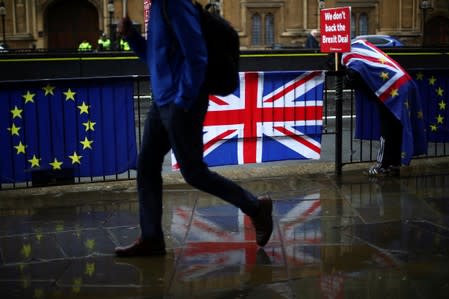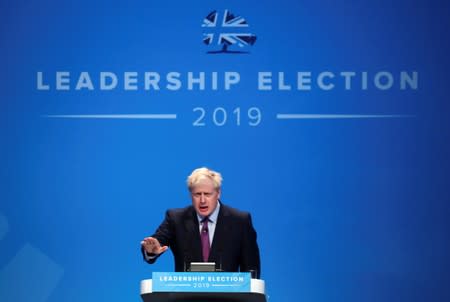Deal, no deal or delay: What will UK PM May's successor do about Brexit?
By William James and Kylie MacLellan
(Reuters) - What will Boris Johnson or Jeremy Hunt do about Brexit if chosen to replace British Prime Minister Theresa May?
May has resigned as Conservative Party leader, triggering a contest that will bring a new leader to power.
Her successor's biggest task will be to take Britain out of the European Union - a job that requires finding an approach to Brexit that will be approved by parliament.
The field of candidates has been whittled down to a final two - ex-foreign minister Johnson and current foreign minister Hunt - with 160,000 Conservative Party members now making the final choice and a decision expected by late July.
Here is an overview of the Brexit plans of Johnson and Hunt.
BORIS JOHNSON, 55 - "Delay means defeat"
Johnson is one of British politics' most recognisable faces. He led the 2016 referendum campaign to leave the EU and went on to become foreign minister under May. He quit the post in protest at her handling of Brexit.
- Supported "Leave" in 2016
- He has promised he will take Britain out of the EU on Oct. 31, with or without an exit deal.
- "We are just over four months away from the date on which, by law, we must leave the EU; and this time we are not going to bottle it," he wrote in The Daily Telegraph. "We are not going to fail. This time we are not going to shrink in fear from the exit, as we have on the last two occasions."
- His preference is for a deal.
- He has described the deal May negotiated as "effectively defunct" and wants to retain certain parts of it while renegotiating or ditching others.
- He says the Irish backstop is the main problem with the deal that needs to be resolved.
- He believes the EU can be persuaded to renegotiate if Britain shows it is properly prepared for a no-deal exit.
- He has also said he would withhold payment of a previously agreed 39 billion pound ($49 billion) exit bill unless he got a better deal.
- He believes existing international law could provide for a 'standstill period' if Britain leaves the EU without a deal, during which the current relationship with the EU on tariffs would remain unchanged. This claim has been disputed, including by Bank of England Governor Mark Carney.
- He has not publicly ruled out suspending parliament to force through a no-deal exit. Media reports say he has told colleagues he is not attracted to the option of suspending parliament.
JEREMY HUNT, 52 - "We need to get real"
Hunt replaced Johnson as foreign minister in July after serving six years as health minister. That role made him unpopular with many voters who work in or rely on the state-run, financially stretched National Health Service. He speaks fluent Japanese.
- Supported "Remain" in 2016
- Wants to renegotiate May's Brexit deal with the EU.
- Is opposed to a no-deal Brexit, but is not willing to rule it out. He would prefer a no-deal Brexit to no Brexit at all.
- Would be prepared to delay Brexit beyond Oct. 31, but has declined to set a deadline beyond that.
- If parliament blocked a no-deal Brexit, he intimated there would have to be delay:
"In that situation, you would have to carry on negotiating," Hunt said. "I want to leave by Oct. 31 but if parliament stops it the prime minister has to obey the law."
- He says his experience in business would give him a better chance of renegotiating the deal, particularly on the Irish backstop.
- Believes shutting down parliament to force through a no-deal exit would be a profound mistake.
(Additional reporting by Elizabeth Piper; Editing by Guy Faulconbridge)



